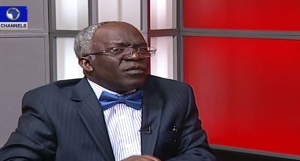
Mr Femi Falana was giving his opinion on the efforts of the Muhammadu Buhari’s administration to tackle corruption and recover looted funds.
“I think so far so good.
“Pursuant to section 15 of the Constitution. Every government in Nigeria is mandatorily required to fight corruption. The provision is to the fact that the Nigerian state shall abolish corrupt practices and abuse of power,” Mr Falana stated.
He further said that every administration both military and civilian, had to an extent fought corruption, giving instances of their efforts.
“Since the Sani Abacha period, every government has tried one way or the other to fight corruption.
“The Abacha junta that enacted the advance fee fraud and failed bank decree dealt with certain banks’ executives.
“The Abdulsalami Abubakar’s junta investigated General Sani Abacha’s junta and not less than one billion dollars was recovered in terms of money and other assets.
“The General Ababakar era enacted the forfeiture decree.
“Even President Jonathan fought corruption in his own way, you will be surprised,” Mr Falana stated.
He explained that last year, when the government had to withdraw the charges against Mr Mohammed Abacha after 14 years, the office of the Attorney General issued a statement to the fact that the withdrawal was occasioned by the fact that $970 million from the Abacha loot has been recovered by the Jonathan government.
“Under that government, $458 million was also forfeited by the United States government which has not been repatriated yet.
“Through some plea bargain, that is what they call it, the Jonathan government made about $120 million.
“Every government in Nigeria investigates the past, usually the previous government.
“For the past 16 years, the PDP and the Abubakar Junta recovered about $3.2 billion from the Abacha loot. It is the most successful loot recovery in the world,” he explained.
For the fight against corruption in Nigeria to record meaningful achievement, the Lawyer suggested that the government should provided an enabling environment for people to expose corruption and give the anti-graft agencies the autonomy, recognised by law, to prosecute those indicted for corruption.
Some Nigerians have also accused some court judges of corruption, but the lawyer dismissed the assumptions, saying that there are incorruptible judges in Nigeria, giving instances where Nigerian judges had ensured that funds fraudulently collected from a bank in Brazil was recovered.
“What Nigeria needs is the current practice of having special divisions of the regular courts and ensure that they are manned by judges who understand what corruption is all about.”
He said that an Act enacted by the former administration – the Administration of Justice Criminal Act – had put an end to some anomalies in the law that had given suspected criminals the opportunity to seek orders stopping their trial.
“Under section 2(493) of that law, you can no longer stay proceedings in a criminal trial or suspend any trial. All objections must now be considered along with the main case.
“The law mentioned earlier has now provided that trial of criminal cases in Nigeria, including corruption cases and cases of terrorism, will now be conducted day by day. Where it is impossible to do that adjournment must not go beyond 14 days in between,” he said.
Mr Falana further stressed the need for all Nigerians to be treated equally by prosecuting agencies before the law, condemning situations where the rich are not even handcuffed while the poor get unfair treatments during their arrest.

